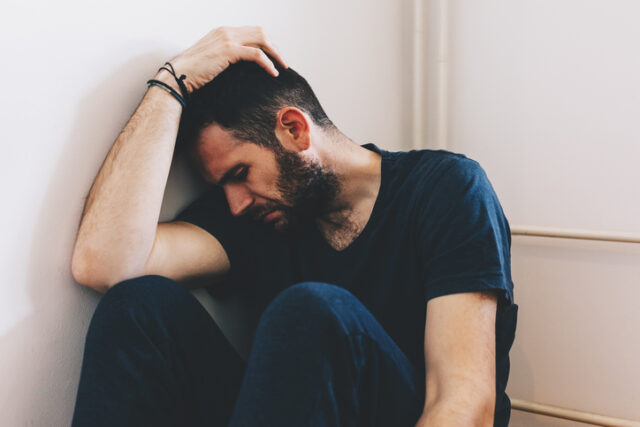Depression is hard enough without the added weight of shame, but for many people, the embarrassment around it runs deep.

While there’s absolutely nothing to be ashamed of when it comes to mental health issues, that doesn’t shield those who suffer from depression from experiencing it. These moments don’t always look dramatic, but they quietly eat away at your self-worth and make healing harder than it needs to be. These are some of the common struggles of the condition that often lead to a feeling of deep mortification.
1. Struggling to keep up with basic hygiene

When you’re in the thick of depression, even things like brushing your teeth or taking a shower can feel like mountains to climb. However, when you avoid these routines, the shame creeps in fast, especially if someone notices. You know it’s not laziness, but that doesn’t stop the embarrassment from hitting hard. The pressure to “look fine” on the outside only adds to the internal load you’re already carrying.
2. Cancelling plans (again)

You want to show up. You even meant it when you said yes. But when the day comes, the thought of small talk, noise, or pretending to be okay feels unbearable, so you cancel. Then the guilt rolls in. You worry people are judging you, getting tired of your excuses, or writing you off altogether. It’s not just missing out; it’s feeling like you’ve disappointed someone again, even if they’re kind about it.
3. Crying in public, or at the wrong time

Sometimes the tears hit without warning. A simple conversation or one small comment, and suddenly you’re overwhelmed. If it happens around other people, the shame can feel immediate and crushing. Even if no one says anything unkind, you might feel exposed or weak for not being able to hold it together. It’s not the crying itself that hurts. It’s the story you tell yourself afterward about what people must think.
4. Not having an answer when someone asks how you are

“How are you?” is such a casual question, but when you’re struggling, even that can make you freeze. Do you lie and say “fine”? Do you risk being honest and make things awkward? When your mood doesn’t match the moment, it creates this quiet internal panic. You want connection, but you also want to disappear. That tension builds its own kind of shame.
5. Falling behind at work or school

When concentration vanishes and motivation disappears, deadlines start slipping. Tasks that were once easy now feel impossible, and you know people are noticing. Even if you’re doing your best, it often doesn’t look like enough from the outside. That gap between your effort and your results can trigger a wave of embarrassment that makes it even harder to speak up or ask for help.
6. Seeing your mess pile up at home

The laundry, the dishes, the unopened mail—it’s not just clutter, it’s evidence. Proof (in your mind) that you’re failing, that you’ve let yourself go, that something must be wrong with you. However, it’s not proof of weakness, by any stretch. It’s proof of how heavy depression is. Still, when you look around and see things getting out of control, the shame tends to settle right next to the exhaustion.
7. Feeling numb around people you care about

One of the hardest things about depression is that it dulls your ability to feel present, even with the people you love most. You might be sitting across from them, smiling on the outside, but feel completely disconnected. Afterward, the guilt is real. You wonder why you can’t just enjoy the moment or show up emotionally. You might even start pulling away out of shame, which only deepens the loneliness.
8. Struggling to respond to messages
 Source: Unsplash
Source: Unsplash You read the message. You want to reply, but your brain stalls, your body feels heavy, and it just doesn’t happen. Days pass, and now the guilt has grown bigger than the task itself. Eventually, you might ghost people not because you don’t care, but because you care too much, and can’t face what they might think. That spiral of silence often comes with a strong sense of embarrassment you can’t explain.
9. Comparing yourself to more “together” people

Even when you know it’s unfair, the comparisons still sneak in. You see people waking up early, exercising, achieving goals… Meanwhile, you’re struggling to make it through the day. It’s not just envy, it’s shame. You start to wonder what’s wrong with you, why you can’t function like everyone else, and whether you’ll ever feel that “normal” again. It’s a private, painful kind of embarrassment that lingers.
10. Having to explain depression to someone who doesn’t get it

Whether it’s a partner, parent, or boss, trying to explain why you’re struggling can feel like a spotlight on your most vulnerable parts. You want understanding, but fear being judged, dismissed, or pitied. Even if the conversation goes well, there’s often a lingering discomfort. You second-guess what you shared or replay their reactions in your head. That emotional vulnerability hangover is real, and often rooted in embarrassment.
11. Feeling like your emotions are “too much.”

When you cry easily, react deeply, or just have off days, it’s easy to feel like you’re the emotional one, the unstable one, the person people tiptoe around. That perception, real or imagined, can trigger deep shame. You might start hiding how you feel or pretending everything’s fine just to protect yourself from being “too much” for other people.
12. Forgetting things or losing track of time

Depression fog can mess with memory and time in ways that make daily life harder. You might miss appointments, forget important details, or lose whole hours without realising. When someone points it out, or you’re forced to confront how off-track things are, embarrassment kicks in fast. You know you’re trying, but it often doesn’t look that way to other people.
13. Feeling like you have to hide your depression altogether

Maybe it’s because you don’t want to be treated differently. Maybe it’s because you’ve tried opening up before, and it didn’t go well. Either way, hiding how you feel becomes your default, and it’s exhausting. Keeping that mask in place can feel like a full-time job, and the fear of it slipping even slightly brings its own kind of shame. Just knowing how hard you’re working to “seem okay” can be a trigger in itself.




